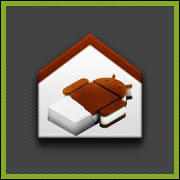
If you’ve been waiting with the patience of biblical figure Job for your handset makerto release a hardware-specific version of Android’s latest incarnation, the 4.0 operatingsystem called “Ice Cream Sandwich,” or ICS, and it hasn’t yet, you can try cloning it.
You can achieve this without rooting, by taking advantage of a launcher replacement app that providesthe elegant look and feel of Android 4.0 while retaining your base Gingerbread orearlier OS engine.
The Back Story
Hardware makers have been slow to adopt ICS even though it was released way back inancient phone OS history — the fall of 2011. This is partly because the software developersare working significantly faster than the hardware makers. Indeed, developers are nowgearing up for Android 4.1’s Jelly Bean.
If you can’t have ICS yet, or possibly ever, you can at least make your phone look like ithas ICS — while you wait for Jelly Bean, that is.
Installing the Launcher
Open the Google Play app on your device and perform a search for “ICS Launcher.”Select the Team Syndicate ICS Launcher app and allow it to install on your device.
Tip: Be aware that there are alternative ICS clone apps available from other publishers,including themes for existing launcher apps that you may have installed and device-specific versions.
Press the center hardware “Home” button on your device and check the “Use by Defaultfor This Action” check box. Then press “Complete Action Using ICS 4.0 Launcher.”
Ignore any other launcher option that may appear — for example, the Samsung stocklauncher like “Samsung Home” or “Launcher,” which Toshiba uses.
Choose Your Wallpaper
Long-click on any home screen and choose “Select Wallpaper” to see ICS Launcher-specific wallpapers.
Look for “Select Wallpaper” along with the ICS Launcher logo,which is represented by a house icon with a chocolate-coated ice cream bar icon within it.Choose a wallpaper by tapping on it.
A Few Issues
Explore the home screens by swiping left. You’ll see a faithful replication of the ICS look and feel.
Click on the six-dot icon “App Drawer” button in the lower-center part of the screen tolook for possible screen resolution-caused issues.
On the mini form factored entry-level Samsung Y, for example, app button labels withinthe App Drawer are unreadable, whereas, on better-specified devices, you’ll get goodresults. Results on the Motorola Photon phone are fine.
Tweaking Your Preferences
Add widgets and shortcuts if your install is a keeper by pressing on the “Home” screenagain and choosing the widget or shortcut option you want from the menu that willappear.
Press the hardware “Menu” button on your device while in the Home screen to bringup “Launcher Settings” options.
Here you’ll be able to change desktop layout and preferences, like autofit, that can fixanomalies with look; change user preferences like gesture behavior; configure the statusbar and its content; tweak the colors and tints; customize text preferences; change batteryindicator preferences; and reboot the launcher.
Play with these settings, but be aware that some of these settings require you to purchasethe paid ICS+ version from the Google Play Store. The upgrade costs US$1.29.
Easy Reversal
Clear ICS Launcher as your default launcher and return to your original OS launcherby going to “Settings” and choosing “Applications” and then choosing “ManageApplications.”
Scroll down until you find the ICS Launcher and press the “Clear Defaults” button. ICSLauncher will no longer be launched by default.
Alternatively, just delete the ICS 4.0 launcher app from the “Applications” settings area.
Want to Ask a Tech Question?
Is there a piece of tech you’d like to know how to operate properly? Is there a gadget that’s got you confounded? Please send your tech questions to me, and I’ll try to answer as many as possible in this column.
And use the Talkback feature below to add your comments!





















































